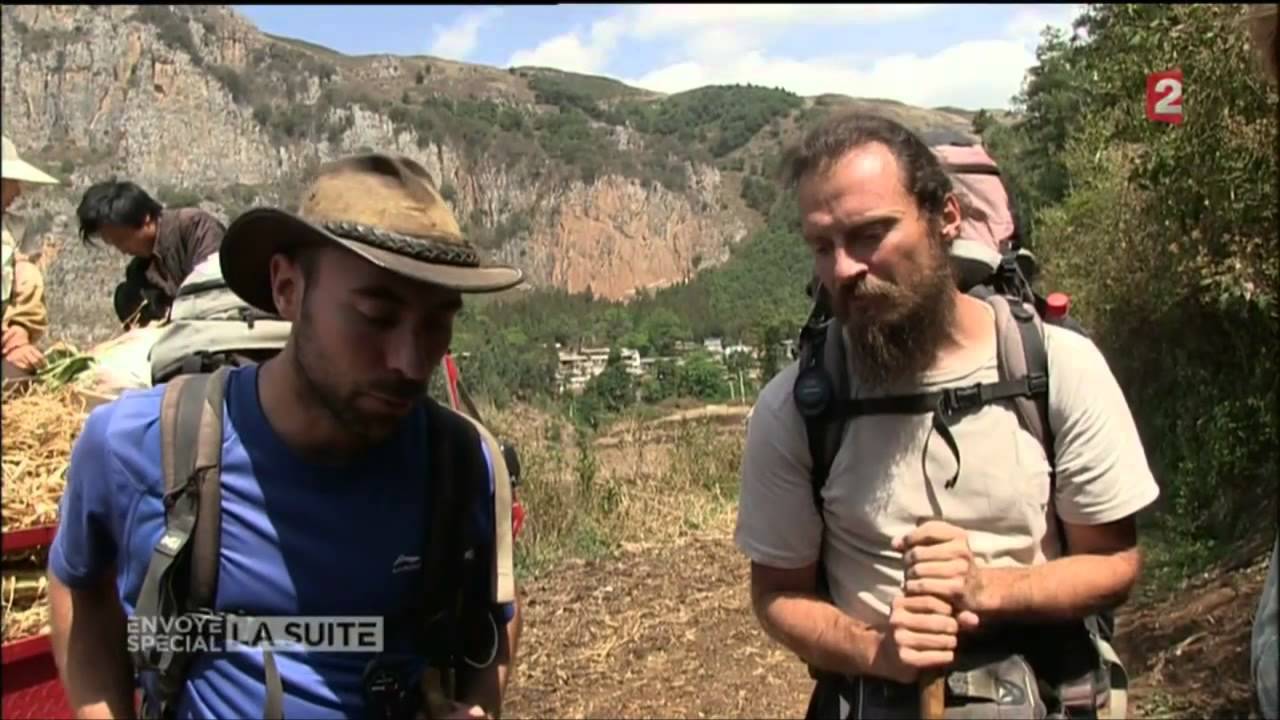If you happen to see two backpack-toting white men doing some serious walking, chances are they are the globe-trotting French guys who have been walking for the past six years in a journey of a lifetime through many countries that has now brought them to Malaysia.
Killian Blais, 30, and Thierry Montaner, 37, were complete strangers who first set out on this adventure not knowing what to expect – except for their shared idea of a world walk. They are not the first people to embark on such an epic journey. But to walk – and stick together over the past six years through thick and thin – is quite a sensational feat in itself.
It’s been 16 countries and counting, through a host of cities and countless streets since they took off from the town of Valence, France, in mid-2008. Among countries they have set foot in are Italy, Croatia, Serbia, Greece, Turkey, Azerbaijan, China, Vietnam, and Thailand.
They had originally embarked as a team of eight – six men and two women – reveals Blais in an e-mail interview.
“None of us knew each other prior to the trip; we had met online through forums and social networking. The idea (to do this walk) eventually brewed among our group, and it took us about a year to plan for the trip,” he recalls.
Romance on the road
“We determined the best route and itinerary based on factors like visas, security, climate conditions and everyone’s interests. In the few months leading up to the trip, we organised a test trek in the French Alps during winter, as the tough surroundings would enable us to learn more about each other and see who was really motivated to do the trip,” says Blais. (At the time of writing, they had passed Teluk Intan, Perak.)
He reveals that love found its way into the team, as the two women quickly formed romantic bonds with two other men. Four months into the walk, the two couples eventually headed off in their own direction via hitchhiking.
Around the same time, another guy headed back home as planned, which left them with a party of three. After the first year of travelling, another fellow decided to continue alone and is currently living in South America – that makes Blais and Montaner the two remaining members today.
“The experience from these six years of walking has been invaluable! Walking was a way for us to slow down our daily pace, in an age and society where we are always competing either to be the fastest or the first,” shares Blais.
“It feels like we are always running out of time, and that time is taking and leading us in a way that we are living an autopilot mode, forbidding us to think and gain control of ourselves again. Philosophical this may be, but walking has helped us see the world in a genuine experience like no other and enabled us to inspect the world and reflect upon it.
“The memories we have built are things we will always treasure, though of course, there are other aspects that we miss during our time away like our family and friends, French food, and women,” he adds in jest.
Back home, he works as a computer programmer while Montaner is a theatre technician. The long working hours and time spent inside public transportation (over 10 hours a week) began to take a toll on him, eroding the purpose and meaning of how life should be lived.
“Little by little, it became clear that there were differences with what we expected of ourselves and the expectations demanded by society. I told myself that I had enough of all the consumerism that engulfs us and it’s time to take stock of my life and lend more meaning to it,” continues Blais.
“In fact, we are both not the outdoorsy sportsmen type but rather sedentary. Thierry was weighing 100kg prior to this trip, but we reckoned that like anything else, it’s a matter of adapting.”
When asked about the challenges they had faced through the six long years, there are plenty of tales. Crossing the High Tibetan Plateau in Western China was an indelible moment, says Blais, as they continuously walked for 28 days without coming across any village.
“During this vast landscape crossing, we saw more wildlife than I ever did in my entire life. Then, when we finally encountered people, they hosted us for one night, shared their meals with us, and kindly gave us advice on how we should proceed with our route, or what to look out for.
“And of course, walking without any other transportation is a challenge in itself. But it wasn’t for the sake of making or breaking a record. The upside is that it can be flattering for the ego when you have people following you, supporting you, and being featured on television too.
“In Kazakhstan, we actually stayed in Almaty for four months trying to get our Chinese visas – it was the longest stay in the same place! So, where before we would walk an average of 20km a day and 500km a month, we had to intensify our walking distance double-fold to about 40km per day in order to complete China before our visas expired. This we did every single day, for two months,” he reminisces.
RM8.40 a day
And what about the “unimaginable” fact that they are surviving on a budget of just two euros (RM8.40) a day? Blais lightly brushes off the seeming impossibility, stating that they would always choose cheap street food for meals. And there were always tents or other kinds of free accomodation.
“Since we could not plan for years of accommodation and expenses, there were big improvisations and adaptations made along the way. But having been in a country after a while, it became pretty easy to know what the odds are (of finding) good places you could put up at.”
Blais reveals however that they have overshot the original timeline that had been set for the entire trip, which was five years. They have only reached Malaysia after six years, and still have the islands of Indonesia, plus Australia and America to complete their world tour.
Essentially, it drives home the point that things don’t always go quite according to plan, or that you can’t really plan for what’s in store over the next few years.
“Just several months into the trip, our original schedule was already blown away. I guess it was a case of allowing ourselves to take the time to live according to our instincts, where you naturally tend to slow down and enjoy the places you are in.
“That’s how we ended up settling down for several weeks or sometimes months in some places. After this, we will have to take boats to Indonesia, Australia and America which will considerably accelerate the travel time, so we are estimating that it will take three more years for us to come full circle to where we started i.e. France,” says Blais.
He hopes to be able to inspire people to do what they have done.
“We learnt later on during the trip that a lot of Americans have done this, but with the help of sponsors and big logistics teams behind them. And we realise that we have done way too much preparation in advance, like visas for countries that we were to cross only a few years later.
“However, immigration laws change very quickly, so by the time we reached a particular border, we had to recheck all the information anyway. These accumulated experiences only serve to shape us into wiser persons. It’s life-changing,” says Blais.
www.thestar.com.my





